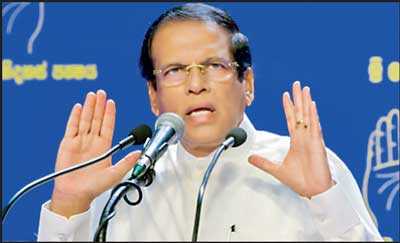Friday Feb 13, 2026
Friday Feb 13, 2026
Wednesday, 5 December 2018 00:00 - - {{hitsCtrl.values.hits}}
Vowing that the current political crisis would be resolved in one week, President Maithripala Sirisena yesterday defended his decisions since 26 October, insisting he had no alternative but to remove Ranil Wickremesinghe from the post of Prime Minister, charging he had caused much destruction to the country.
 |
President Maithripala Sirisena - Pic by Shehan Gunasekara |
Speaking at a special Sri Lanka Freedom Party (SLFP) convention at the Sugathadasa Stadium, President Sirisena delivered a detailed speech defending himself and insisting that he was committed to safeguarding the country’s best interests.
“The current political crisis will be resolved in one week. It will be completely resolved. This is an effort I will make for the public, for you, for our motherland. I extend the hand of peace to all politicians and political parties. This political situation was created by Ranil Wickremesinghe, by his actions, and by his policies but we will work to resolve it. We will save this country,” he told a cheering audience.
“Ranil Wickremesinghe destroyed this country. Ranil Wickremesinghe also undermined the United National Party (UNP), which was earlier an establishment with renowned political leaders. He also destroyed me to some extent. The only solution was to remove him from the Prime Minister’s chair. We must go on a political journey that suits us. That is my aim.”
Reiterating his statement at the meeting with the UNP on Monday, Sirisena emphasised that even if all 225 Members of Parliament signed a petition seeking the reinstatement of Wickremesinghe as Prime Minister it would not be implemented by him. Sirisena criticised what he termed the “extreme neoliberal” policies of Wickremesinghe and charged that the UNP leader was removed from the problems of the masses and therefore disinterested in seeking solutions for them. He also stressed that he would take steps to strengthen the SLFP as it was the only political party capable of standing up against the neoliberal economic policies of Wickremesinghe.
“The petitions filed before the Supreme Court and Court of Appeal are still being heard. These cases are not for murders or rape. These are political cases. People have different ideas and views about the response of the courts to these cases. I will always honour the courts and I will accept the decisions of the court but people will have different impressions. Some people say courts are impartial but others say they are partisan. There are different definitions but we work within the law and within the limitations of the Constitution,” he said.
“I wish to give a message to the people of our country through this event. The history of the Sri Lanka Freedom Party (SLFP) is well known to anyone. It is built on patriotism and the protection of our culture and a united and peaceful ideology. The SLFP has always been strengthened by the quality of this ideology. It is not an empty party, it was not created overnight; the SLFP came into being to bring a new political path to Sri Lanka. It has stood for the little people and cared about what happened to the masses.”
President Sirisena said that he still saluted the 6.2 million people who voted for him to be appointed as Head of State in 2015. He insisted that the decision he took to become the common candidate was as important now as it was in late-2014 as it has created the space for a new political climate in Sri Lanka.
“In this same way the decision that I took on 26 October is also the correct decision. Why are this decision and the one taken to dissolve Parliament the correct ones? Because they were taken within a political philosophy for the benefit of the country. It was a decision taken against corruption, mismanagement and wastage. It was part of an effort to re-establish a decent society in Sri Lanka. These decisions were all taken to strengthen democracy, protect our resources and reject corruption.”
President Sirisena also downplayed the political turmoil in the country.
“Having endured and survived much, the SLFP will rise against the extreme right-wing political views of Ranil Wickremesinghe. What is the question before us today? Is the country really in political turmoil? There is no such situation. There is a political crisis in Sri Lanka but how do we define this? Conflict management is a science, resolving political conflicts is a discipline.”
Recalling that within minutes of him being sworn in as President, United National Party (UNP) leader Ranil Wickremesinghe was sworn in as Prime Minister, Sirisena went onto insist that Wickremesinghe was responsible for the destruction of the ‘Yahapalanaya’Government. He insisted that despite all his patience he was left with little choice but to appoint MP Mahinda Rajapaksa at the end of three years.
President Sirisena insisted that he had made every endeavour to reduce the impact of Wickremesinghe’s neoliberal political actions as he viewed them as detrimental to public interest. He also charged that people of the north were betrayed by Wickremesinghe and the political needs of the Tamil community could have been met by other measures that were ignored. In his turn, President Sirisena said he had issued five gazettes, including the one which appointed Rajapaksa and dissolved Parliament, to protect democracy and safeguard the country.
The President also cited other countries such as Italy, Australia and Germany as nations that had witnessed serious political upheaval in the past few months. Germany, he pointed out, had no government for six months as negotiations were held to appoint a coalition government. The Australian Prime Minister changed overnight, he pointed out, saying that political changes could be seen in other democratic systems of governance.
“I’m not saying that everything that happened in Parliament is right. I condemn the brawls that happened in Parliament. We have to win our battles democratically.”